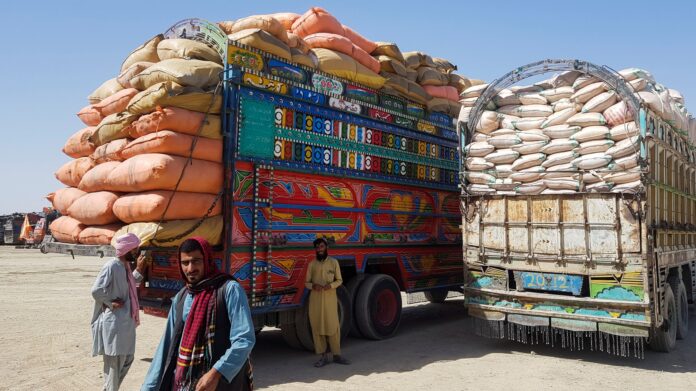ISLAMABAD: The Federal Board of Revenue (FBR), and the Ministry of Commerce, in multiple notifications, have strictly tightened Pakistan’s policy stance on being a transit country of commercial imports to Afghanistan.
The Ministry of Commerce by the means of SRO 1397(1), has banned various goods to be transited through Pakistan, into Afghanistan. This includes various categories of fabrics, tyres, black tea, home appliances, toiletries, cosmetics, and nuts. The banned items have been rendered “prone to smuggling” by the ministry of commerce.
Moreover, on the recommendation of the ministry of commerce, FBR has imposed a 10 % processing fee on major categories of Afghan transit commercial goods. According to the notification, the federal government has imposed a processing fee at the rate of 10% ad valorem on the Afghan transit commercial goods imported into Afghanistan via Pakistan.
Major categories include confectionery and chocolates, footwear, machinery (mechanical and electrical), blankets as well as home textiles and garments.
In two separate SROs, the FBR has also put forward draft resolutions of stricter controls on the transit trades including checks and guarantees to ensure that the consignments reach their destinations.
The FBR has proposed new conditions of increasing the incidence of scanning the consignments after the Goods Declaration (GD) has been signed. The FBR has also floated draft resolutions for mandating a bank guarantee equal to duties and taxes of the consignment in order to ensure that the Afghanistan-bound goods reach their final destination. These guarantees could be encashed in case the imported goods do not reach Kabul.
What is the Reason?
Afghanistan is a landlocked country that does not have access to a port of its own. Meaning that any major trade that happens in or out of Afghanistan, happens through another country. Therefore any imports received at a Pakistani port, meant for Afghanistan are transited through Pakistan to Afghanistan.
The selling of in-transit goods inside the transit country (in this case Pakistan) is considered illegal and is under the ambit of smuggling.
Recently, the Ministry of Commerce has asked FBR to take measures regarding smuggling-prone items imported by Afghanistan in transit through Pakistan. It was noted that due to a low amount of custom duties in Afghanistan, and a restriction on the import of certain items in Pakistan, businessmen from both countries were colluding to illegally benefit from the transit.
The phenomenon of arbitrage because of the lower custom duties of Afghanistan is not new to Pakistan. Various studies, including reports from the FBR itself have pointed out the rampant smuggling occurring through this channel. However, as reported by media sources, an ultimate step has been taken only after the recent collaboration between the civil and military leadership under SIFC.
Why now?
While the aforementioned reason is one reason for Pakistan to take these steps, there have been other, more urgent reasons to cater to these problems.
One of these reasons is that during the recent regime of restricted imports, and a balance of payments crisis, the effect of this smuggling became too obvious. According to the Ministry of Commerce, the volume of Afghan Transit Trade (forward) via Pakistan increased by an abnormal amount of 67% during FY 2022-23 to US $ 6.71 billion from US $ 4.016 billion during FY 2021-22 .
The figure is strange because this rise in imports of Afghanistan is neither plausible nor understandable. Keeping in view its limited exports and limited funding sources especially after the imposition of multiple types of sanctions on the interim Afghanistan government, the country has suffered an economic crisis. This has caused both its GDP and aggregate demand to fall. On top of that, Afghanistan has had a growing trade deficit in the same period, a fact that does not reconcile with an increase in imports, that too of more than 50%.
A detailed comparative analysis of the major forward Afghan transit trade items of the previous two years gives a more believable explanation. The growth of transit import through Pakistan can be attributed to low volume of imports by Pakistan of the very items that were being “imported to Afghanistan”. Why was Pakistan importing a lower amount of these goods? The step was taken last year in an attempt to restrain the import of non-essential and luxury goods to improve Pakistan’s current account deficit.
This means that the substantial increase in incidence of smuggling of these items has not only caused loss of revenue for Pakistan, but has also rendered the import curtailment measures of the government ineffective. It has also curtailed legal business revenue and caused injury to the domestic industry.
With the balance of payments crises and looming danger of defaulting on its debt, the country could go only so far by letting smuggled goods scot-free onto its soil. It is however important to note that much like many policy decisions, this decision was also taken on a reactive basis
Why does it matter?
Even after this move there are questions about the timeliness of the decision especially since the restrictions on import of some of these items has since been eased. The decision might still be a political one, rather than an economic one, considering the hostilities on the border regions of Pakistan from Afghan soil in the recent past.
With Karachi and Gawadar not available for business, Afghanistan has to opt for longer, more expensive transit routes. Something that does not go in the favour of the already crippling economy.
For Pakistan, the remaining expensive transit with the added cost of processing fee through Pakistan could also lead to a shifting from Pakistan as a transit country altogether. The move, as it stands, answers more questions that it raises.





Jo goods rastey me hain us ka kiya hoga